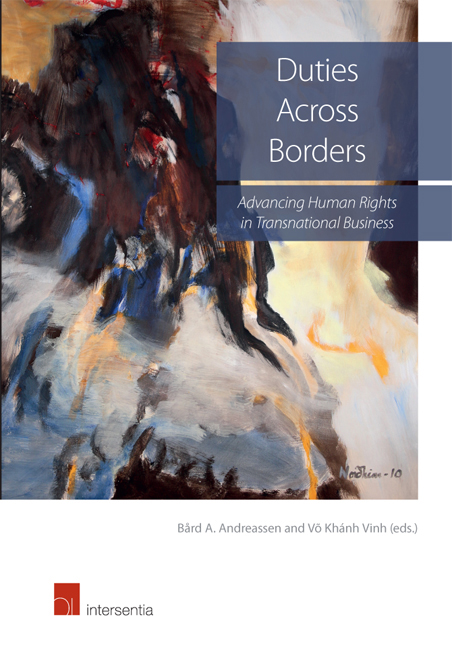Book contents
- Frontmatter
- Preface
- Contents
- List of Authors
- List of Figures and Tables
- Introduction. Business’ Duties Across Borders: The New Human Rights Frontier
- Part I. Conceptual Developments
- Part II Contextual Issues
- Part III Sites Of Regulation
- Chapter 10 Human Rights and Business. An Assessment of the Responsibility of the State in Vietnam
- Chapter 11 Investment Treaties and Human Rights. Reflections from Mining in Latin America
- Chapter 12 Beyond State Duty and Corporate Responsibility. Human Rights in Industrial Zones in Vietnam
- Chapter 13 The Application of the UN ‘Protect, Respect and Remedy’ Framework to State-Owned Enterprises. The Case of the State Oil Company SOCAR in Azerbaijan
Chapter 11 - Investment Treaties and Human Rights. Reflections from Mining in Latin America
from Part III - Sites Of Regulation
Published online by Cambridge University Press: 21 September 2018
- Frontmatter
- Preface
- Contents
- List of Authors
- List of Figures and Tables
- Introduction. Business’ Duties Across Borders: The New Human Rights Frontier
- Part I. Conceptual Developments
- Part II Contextual Issues
- Part III Sites Of Regulation
- Chapter 10 Human Rights and Business. An Assessment of the Responsibility of the State in Vietnam
- Chapter 11 Investment Treaties and Human Rights. Reflections from Mining in Latin America
- Chapter 12 Beyond State Duty and Corporate Responsibility. Human Rights in Industrial Zones in Vietnam
- Chapter 13 The Application of the UN ‘Protect, Respect and Remedy’ Framework to State-Owned Enterprises. The Case of the State Oil Company SOCAR in Azerbaijan
Summary
INTRODUCTION
Mineral extraction in developing countries is a ‘high risk’ investment with unpredictable costs associated to policy changes such as nationalisation and increased regulations by host-governments. In Latin America, many governments have acknowledged demands by civil society organisations (CSOs) to cancel extraction contracts and change their mining codes to uphold human rights and environmental standards. Investment agreements signed between a country, where an extractive company is incorporated, and a host country, with resource endowments, provide investors with a sense of security over their mineral claims and conditions of profit partition. These agreements, which can take the form of Bilateral Investment Treaties (BITs), Foreign Investment Contracts (FICs), or investment chapters of Free Trade Agreements (FTAs), often contain clauses that mandate governments to compensate the company if policy changes result in a loss of profits. With now over 3,160 investment treaties between countries of all regions and economic stature, many governments, having signed on to treaties with such clauses, must weigh the costs of implementing human rights policies. If an arbitration tribunal finds a government's policies to breach the investment treaty, it will issue an award for the government to pay to the investor. Ranging from several millions to in some cases billions of dollars, these costly awards are thought to discourage governments from intervening when investment projects allegedly violate human rights.
There are many grounds for the emergence of conflicts between human rights policies and investment agreements in this sector. A common example in recent cases is the enforcement of a moratorium by a host government on specific types of extractive activities when the operations of these mines are the source of anticipated human rights violations. Large scale metal ore mining, for instance, risks causing harm to human health, contaminating water sources and farm land, as well as conflict with the self-determination rights of indigenous communities. Investors, having acquired land titles (or exploration permits) to search for deposits, but who were then refused secondary extraction permits needed to begin operations, may claim that withholding these permits is a form of expropriation by the government and a breach of the investment treaty. The claims of a treaty breach may even occur in cases where this denial is based on the project's environmental and social impact assessment failing to meet domestic legal requirements of extraction permits (see the case of Costa Rica).
- Type
- Chapter
- Information
- Duties Across BordersAdvancing Human Rights in Transnational Business, pp. 253 - 278Publisher: IntersentiaPrint publication year: 2016



